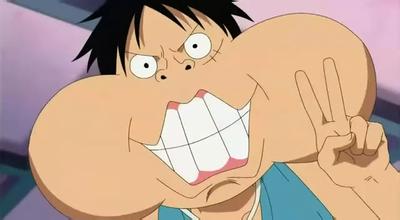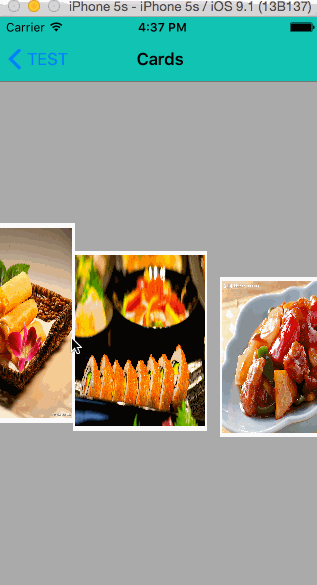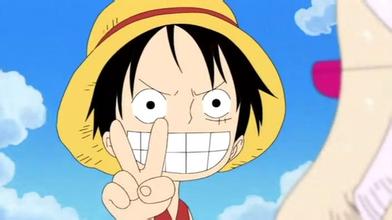还是先看效果图。
这个动态效果我没有用ios 原生的Animation,而是用popAnimation,当然在用之前得用pods把pop下载到你的工程文件中,这个步骤网上有很多资料,按照那里面说的安装就可以了。
我的这个动画是直接封装成一个View的。在controller中只需要一句代码就可以了。
CGRect cardViewFrame = self.view.bounds;
_cardView = [[DynamicCardsView alloc] initWithFrame:cardViewFrame
subImageArray:self.imageArr allImageArr:self.allImageArr];
至于这里面的imageArr是你要在这个View上显示的图片(太多的图片可能太拥挤了)而allImageArr是所有的图片。
下面就看看封装的那个View中是怎么写的。
准备工作:
利用接口中传过来的imageArray ,在View中初始化两类imageArray,
- (instancetype)initWithFrame:(CGRect)frame
subImageArray:(NSArray *)subArr
allImageArr:(NSArray *)allArr {
self = [super initWithFrame:frame];
if (self) {
self.subImageArray = subArr;
self.allImageArray = allArr;
self.subImageCount = subArr.count;
[self getCustomCards];
[self makeCards3D];
}
return self;
}
拿到图片后,就有利用这些图片去初始化我们的卡片CustomCard并且把这些卡片对象放进一个数组中。
- (void)getCustomCards {
NSMutableArray *cardsImg = [NSMutableArray array];
[self.subImageArray enumerateObjectsUsingBlock:^(id _Nonnull obj, NSUInteger idx, BOOL * _Nonnull stop) {
CustomCard *card = [[CustomCard alloc] initWithFrame:CGRectMake(0, 0, 250, 200) image:[UIImage imageNamed:obj]];
card.tag = 100 + idx;
[self addSubview:card];
card.center = self.center;
[cardsImg addObject:card];
}];
self.cardsImg = [cardsImg copy];
}
这儿我做了第二次封装,就是对这个卡片的形状(白色边框,或者里面的布局)当然它也是一个View的子类
- (id)initWithFrame:(CGRect)frame image:(UIImage *)image {
self = [super initWithFrame:frame];
if (self) {
self.backgroundColor = [UIColor whiteColor];
_image = image;
[self setup];
[self addSubview:self.cardImageView];
}
return self;
}
- (void)setup {
self.cardImageView = [UIImageView new];
self.cardImageView.left = 5;
self.cardImageView.top = 5;
self.cardImageView.width = self.width - 5*2;
self.cardImageView.height = self.height - 5*2;
self.cardImageView.image = self.image;
self.cardImageView.contentMode = UIViewContentModeScaleToFill;
}
当然你也可以在这里给每个card添加手势。不过我是在外面一层添加的。
- (void)makeCards3D {
[self.cardsImg enumerateObjectsUsingBlock:^(CustomCard *obj, NSUInteger idx, BOOL * _Nonnull stop) {
CGFloat cardScale = 0.1*idx + 0.8;
obj.transform = CGAffineTransformScale(obj.transform, cardScale, cardScale);
CGFloat cardTranslate = 0;
if (idx == 0) {
cardTranslate = 70;
}else {
cardTranslate = (self.cardsImg.count - idx) * 22;
}
if (idx == self.cardsImg.count - 1) {
[self addGesOnTopCardView:obj];
}
obj.transform = CGAffineTransformTranslate(obj.transform, 0, cardTranslate);
}];
}
这个方法是在View上显示三张图片由大到小,并且只在最外面的那个图片上添加手势。(这样就点击其他图片时无响应)。
然后就是给最上面那张图片添加手势。
- (void)addGesOnTopCardView:(CustomCard *)cardView {
UIPanGestureRecognizer *panGes = [[UIPanGestureRecognizer alloc] initWithTarget:self
action:@selector(cardViewDidPan:)];
[cardView addGestureRecognizer:panGes];
UITapGestureRecognizer *tapGes = [[UITapGestureRecognizer alloc] initWithTarget:self
action:@selector(cardViewDidTap:)];
[cardView addGestureRecognizer:tapGes];
}
这里我是添加两个手势,一个是滑动手势,一个是点击手势。
接着就是一大波的代码了。
- (void)cardViewDidPan:(UIPanGestureRecognizer *)panGes {
CGPoint location = [panGes locationInView:panGes.view];
CGPoint velocity = [panGes velocityInView:panGes.view];
CGPoint translate = [panGes translationInView:panGes.view];
if (panGes.state == UIGestureRecognizerStateBegan) {
self.initialLocation = location.x;
}
if (translate.x < 0 && panGes.view.centerX == self.centerX) {
[self springAnimationToVale:CGPointMake(0, self.centerY)
withView:panGes.view velocity:velocity];
[self bottomCardsViewSpreadAnimationwithVelocity:velocity];
self.isSpreadCards = YES;
}else if (translate.x >= 0) {
if (panGes.view.centerX == 0) {
[self.cardsImg enumerateObjectsUsingBlock:^(CustomCard *obj, NSUInteger idx, BOOL * _Nonnull stop) {
[self eachCardViewDidRotate:obj rotate:0];
}];
if (self.isTapCardView) {
[self makeCards3D];
self.isTapCardView = NO;
}
[self springAnimationToVale:CGPointMake(self.centerX, self.centerY)
withView:panGes.view velocity:velocity];
[self bottomCardsViewShrinkAnimationwithVelocity:velocity];
self.isSpreadCards = NO;
}else if (panGes.view.centerX == self.centerX) {
[self dismissTopCardView:CGPointMake(self.width + panGes.view.width/2.0,
self.centerY)
withView:panGes.view];
[self bottomCardsViewRecoverScaleWithVelocity:velocity complete:^(BOOL finished){
}];
}
}
}
可以看到这里面有三种情况:
1.是直接向左滑动时,三种卡片各自的运动轨迹,也就会展开的。(self.isSpreadCards = YES,这个时候说明可以点击图片了。)
2.在图片展开的情况下往右滑动,这个时候卡片会呈叠起状态。并且卡片不能被点击。
3.直接向右滑动时,最外面一个图片会消失而在图片在底部会增加一张图片。
上面那个方法只是将卡片的滑动和点击进行逻辑判断。
接着就是运用pop中的animation。
- (void)springAnimationToVale:(CGPoint)point withView:(UIView *)view velocity:(CGPoint)velocity{
POPSpringAnimation *swipeAni = [POPSpringAnimation animationWithPropertyNamed:kPOPLayerPositionX];
swipeAni.velocity = [NSValue valueWithCGPoint:velocity];
swipeAni.toValue = [NSValue valueWithCGPoint:point];
[view.layer pop_addAnimation:swipeAni forKey:@"swipeAnimtion"];
}
这个方法中主要运用pop的弹簧动画,在x轴上移动也就是在展开过程中每张图片的animation
- (void)bottomCardsViewSpreadAnimationwithVelocity:(CGPoint)velocity{
[self.cardsImg enumerateObjectsUsingBlock:^(CustomCard *obj, NSUInteger idx, BOOL * _Nonnull stop) {
if (idx == 1) {
[self springAnimationToVale:CGPointMake(self.centerX - 20,self.centerY)
withView:obj velocity:velocity];
}else if (idx == 0) {
[self springAnimationToVale:CGPointMake(self.width - 40,self.centerY)
withView:obj velocity:velocity];
}
}];
}
这个方法中是第二张和第三张图片将会移动的animation。
这样上面的第一种滑动就实现了。
接着就是在展开的情况下点击了,或者是向右滑动。
- (void)cardViewDidTap:(UITapGestureRecognizer *)tapGes {
if (!self.isSpreadCards) {
return;
}
self.isTapCardView = YES;
[self.cardsImg enumerateObjectsUsingBlock:^(CustomCard *obj, NSUInteger idx, BOOL * _Nonnull stop) {
[self eachCardViewDidRotate:obj rotate:-M_PI_4];
}];
}
向右滑动
- (void)bottomCardsViewShrinkAnimationwithVelocity:(CGPoint)velocity{
[self.cardsImg enumerateObjectsUsingBlock:^(CustomCard *obj, NSUInteger idx, BOOL * _Nonnull stop) {
if (idx == 1) {
[self springAnimationToVale:CGPointMake(self.centerX,
self.centerY)
withView:obj velocity:velocity];
}else if (idx == 0) {
[self springAnimationToVale:CGPointMake(self.centerX,
self.centerY)
withView:obj velocity:velocity];
}
}];
}
这里会设置卡片是在点击状态下。(因为展开后的卡片接下来的操作可能会向→滑,也可能点击)所以得有旗子进行标识。
- (void)eachCardViewDidRotate:(CustomCard *)cardView rotate:(CGFloat)angleValue{
POPSpringAnimation *rotateAni = [POPSpringAnimation animationWithPropertyNamed:kPOPLayerRotationY];
[cardView.layer setAnchorPoint:CGPointMake(0.5, 0.5)];
rotateAni.springBounciness = 18.0f;
rotateAni.dynamicsMass = 2.0f;
rotateAni.dynamicsTension = 200;
rotateAni.toValue = @(angleValue);
[cardView.layer pop_addAnimation:rotateAni forKey:@"rotationAnimation"];
}
这个方法会将每个卡片在y轴进行角度翻转
最后就是第三种情况了。
- (void)dismissTopCardView:(CGPoint)point withView:(UIView *)view {
[UIView animateWithDuration:0.3 delay:0 usingSpringWithDamping:0.8
initialSpringVelocity:10 options:0 animations:^{
view.center = point;
} completion:^(BOOL finished) {
[view removeFromSuperview];
[self adjustImageArr];
[self addCardViewOnBottomest];
}];
}
首先让最上面的那张图片滑动消失。同时就得调整图片数组中的数据了。
接着让本来第二张,第三张图片的scale变成第一张和第二张的scale
- (void)bottomCardsViewRecoverScaleWithVelocity:(CGPoint)velocity complete:(void (^)(BOOL finished))completion {
[self.cardsImg enumerateObjectsUsingBlock:^(CustomCard *obj, NSUInteger idx, BOOL * _Nonnull stop) {
if (idx == 1) {
[self recoverScaleWithScale:1.0/0.9 translate:-20 cardView:obj];
}else if (idx == 0) {
[self recoverScaleWithScale:1.0/0.9 translate:-20 cardView:obj];
}
}];
}
- (void)recoverScaleWithScale:(CGFloat)scale translate:(CGFloat)translate cardView:(UIView *)view {
[UIView animateWithDuration:0.3 delay:0 usingSpringWithDamping:0.8
initialSpringVelocity:10 options:0 animations:^{
view.transform = CGAffineTransformTranslate(view.transform, 0, translate);
view.transform = CGAffineTransformScale(view.transform, scale, scale);
} completion:nil];
}
调整图片数组
- (void)adjustImageArr {
id addObj = [self.allImageArray objectAtIndex:self.subImageCount];
self.subImageCount = self.subImageCount + 1;
if (self.subImageCount == self.allImageArray.count) {
self.subImageCount = 0;
}
NSMutableArray *adjustArr = [self.subImageArray mutableCopy];
[adjustArr lastObject];
[adjustArr insertObject:addObj atIndex:0];
self.subImageArray = [adjustArr mutableCopy];
}
也就是把所有图片数组中要显示的图片添加到子图片数组中并且在0的位置上插入。
接着要做的就是把新插入的图片初始化成一个card的对象。
并且生成新的card数组对象.
- (void)addCardViewOnBottomest {
NSMutableArray *adjustCards = [self.cardsImg mutableCopy];
[adjustCards removeLastObject];
[self.subImageArray enumerateObjectsUsingBlock:^(id _Nonnull obj, NSUInteger idx, BOOL * _Nonnull stop) {
if (idx == 0) {
CustomCard *bottomCard = [adjustCards firstObject];
CustomCard *card = [[CustomCard alloc] initWithFrame:CGRectMake(0, 0, 250, 200) image:[UIImage imageNamed:obj]];
[UIView animateWithDuration:0.2 delay:0 usingSpringWithDamping:0.8
initialSpringVelocity:10 options:0 animations:^{
card.center = self.center;
[self recoverScaleWithScale:0.8 translate:55 cardView:card];
} completion:^(BOOL finished) {
[self insertSubview:card belowSubview:bottomCard];
}];
[adjustCards insertObject:card atIndex:0];
}else if (idx == self.subImageArray.count - 1) {
CustomCard *topCard = [adjustCards lastObject];
[self addGesOnTopCardView:topCard];
}
self.cardsImg = [adjustCards copy];
}];
}
这样就可以周而复始的滑动了。
这个工程代码我会放到我的github上。因为工程代码中还有一些动画,地址我会放在最后一篇动画中。


